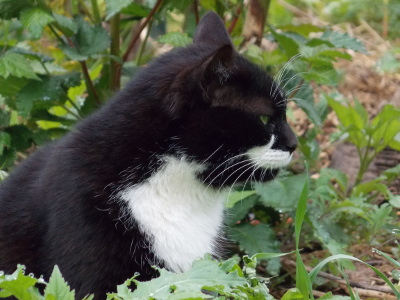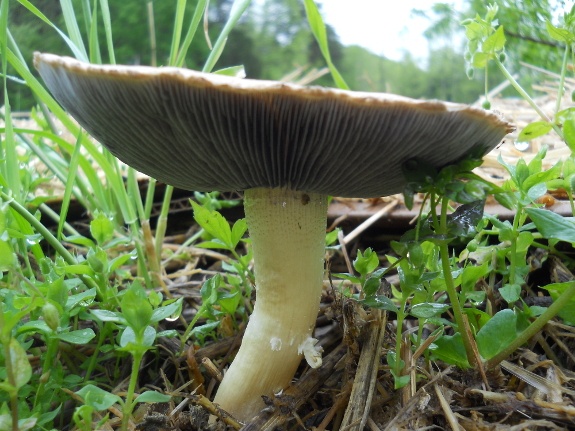
Quakers on simple living

As Everett once wrote
on his blog, voluntary simplicity is far from
simple. It's tough to wrap your head around why you might choose
to embrace simplicity in your life, and equally tough to figure out how
to be simple when mainstream society considers simplicity  close
to a
sin. On the other hand, when I achieve simplicity in bits and
spurts, I understand the importance of the measure --- the word
"simple" in
the phrase refers to the peace you feel when you've cut that cord to
consumer culture.
close
to a
sin. On the other hand, when I achieve simplicity in bits and
spurts, I understand the importance of the measure --- the word
"simple" in
the phrase refers to the peace you feel when you've cut that cord to
consumer culture.
Despite believing in the
philosophy, I haven't done much reading about simplicity because
writers like Thoreau
generally make my eyes roll. But when a copy of the Baltimore
Yearly Meeting of the Religious Society of Friends (Quakers)'s Faith and
Practice: First Reading
(2012) fell into my lap, I flipped through the sections on
simplicity and found some helpful advice. Here's an example:
 History has shown that when a
future outcome, however
noble, seems of greater worth than the human being before us, any
means, any atrocity, is possible.
History has shown that when a
future outcome, however
noble, seems of greater worth than the human being before us, any
means, any atrocity, is possible."We need to think of simplicity not as an impossible demand, but as an invitation to a more centered, intentional, and fulfilling Spirit-led life. Simplicity flows from well-ordered living. It is less a matter of doing without, than a spiritual quality that simplifies our lives by putting first things first.... This does not mean that life is to be poor and bare, destitute of joy and beauty. Each must determine...what promotes and what hinders the compelling search for inner peace...."


I'll close with one last
quote found in Faith and
Practice:

What do you think about
voluntary simplicity?
Want more in-depth information? Browse through our books.
Or explore more posts by date or by subject.
About us: Anna Hess and Mark Hamilton spent over a decade living self-sufficiently in the mountains of Virginia before moving north to start over from scratch in the foothills of Ohio. They've experimented with permaculture, no-till gardening, trailersteading, home-based microbusinesses and much more, writing about their adventures in both blogs and books.
Want to be notified when new comments are posted on this page? Click on the RSS button after you add a comment to subscribe to the comment feed, or simply check the box beside "email replies to me" while writing your comment.

Anna, this is a beautiful post. A great thing to read here early on a sunday morning as I sit with my coffee ( after having fed the chickens, cats, amd checked onnthe garden of course!). i AM a person of faith and found these words quite lovely. There are only a few things that are really important. Living simply means being intentional about those few things, and letting the rest go by. There is a certain peace that comes with this, and I think we can find great joy in it. But I dont say it is easy in our current culture, and for families with children, alot harder than for folks like us whose kids are grown and gone. Voluntary simplicity does involve being content with both our " status" ( or humble lack thereof) and also whatever simple tasks are required of us day by day. That comes out of knowing what is truly important and acting out of that.
It is said that Saint Augustine was working in his garden one day, and someone asked this great cleric, " if you knew that today was your last day on earth, what would you do with it?" To which St. augustine replied, " i would finish hoeing in the garden." I have always loved that anectdote, as I think it describes a life lived in great contentment. If the task of the day was working in the garden, then that was doing God's work, and nothing more was required.
Kelly's quote about having too many irons in the fire zapped me like a little electric shock. I am still pondering the bit about a program of social responsibilities.
Deb, I think you are quite right about it being harder to simplify when you have younger kids. Although I feel like I have a powerful motivation in having my kids watch my decision-making, I also struggle when I am making decisions that affect how others will see them. Case in point, should I send my kids to school in patched uniforms? I have no problem at all wearing well-worn clothes myself; I've given up caring what people who judge me on my appearance think. But kids (mine, anyways) are at a different point developmentally. I too would definitely have minded standing out among my peers in that way when I was in school; I was already embarrassed wearing Value City clothes, much less if they had been patched...! But when my son comes home for the second time in a week with a hole in the knee of his khakis, I'm caught between my frugal, practical impulse to patch and my status-conscious, consumerist impulse to just order a couple more pairs. Living simply is indeed not always simple.
I think simplicity is a state of mind. It's about strength of character. Having kids can challenge your ideas about simplicity, but I don't think they necessarily push someone away from simplicity or make it more difficult to achieve. Just like having an illness that requires constant medical therapy (type I diabetes, for instance) doesn't mean you can't live simply, or that you aren't living simply because you have to incorporate complicated things into your life.
Simplicity for me is flexibility. It's about being prepared to accept life as it is, and of course knowing how to prioritize what's in your life at the moment. A clear, decisive state of mind is what it takes. I disagree that simplicity is any more difficult for people today than in the past. The most complicated things in life, in my experience, are social demands. Those are always present. If it were so easy in the past to achieve simplicity, then all of the philosophies and religions that have preached it throughout history would be unremarkable. We certainly wouldn't be discussing them today.
For me, I have to be careful of mistaking stinginess for frugality. Sometimes I think I am being frugal (and thus enjoying simplicity), but instead I am merely being stubborn and stingy. It hinders me. Because of that, I've learned that material measurements aren't a good way to examine simplicity.
I imagine life in prison is materially simple, but character determines whether or not a person in prison can achieve what many of us hope to gain from voluntary simplicity.
When it comes to kids, solving the problem of knee patches and such, I don't think there is one solution that is simple (patching)vs one that is not (buying new). Where I live, I can find nice second hand clothing and uniforms that don't need patches. Something has to be done for the kids, and buying new pants isn't always frivolous.
When I first started homesteading, I envisioned going off the grid and possibly living without electricity. Later, I found that living without electricity is technically considered neglect of children, and can get your children taken away from you. I don't feel like making the choice to live with electricity and buffer myself against that possible outcome actually impacts my choice of voluntary simplicity. There are still many other areas in my life to simplify.
That's all I am saying. Having a strict view of what is simple and what is not, and then saying that there is a gradient of simplicity based on material examples is like saying one is not a gardener because they use technique ABC instead of XYZ. It doesn't make sense to me.
I have seen very simple people occupy large homes because that's what they have and they don't feel the need to downgrade. I have seen very excessive, impulsive people occupy marginal homes and live meager lives because of their choices.
Going to the extreme, I don't think homesteading or homeschooling are necessarily choices that advance cimplicity. In my youth, I would have much preferred traveling with a suitcase and bumming off of others. It was simple. I survived. I felt free and ecstatic. That's just a different type of simplicity. I wouldn't do that now. I wouldn't feel content with that.
Being simple is easier for some than others, depending especially upon personality. I am a Quaker who struggles with bipolar consumptive symptoms that trigger compulsions to buy that are not about keeping up with Jones at all but feeding a food addiction and wanting to be comfortable and a bit narcissistic. I too would love to be contacted to talk about this.
I am Anna's sis and we both grew up in the exact same place. She was nurtured by the farm longer as we moved in town so soon after I popped out alive.
I mean to read more of the comments. I also want to say hi to Sheila who I love and am holding in the light.
Namaste